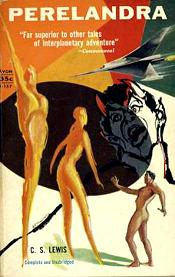I ran into an interesting article through Out of Ur entitled Formation via Fiction. The piece is aimed at Church leaders, and its gist is that most pastors sorely neglect reading fiction. It’s an interesting point, and one I can corroborate. Having been on staff with two different churches over an 11 year stretch, I can attest to building a library top-heavy with the subject of 1.) Theology and 2.) Administration. I’m guessing when most pastors aren’t reading Calvin’s Institutes of the Christian Religion or Barth’s Church Dogmatics, they’re reading Covey’s The 7 Habits of Highly Effective People or Blanchard’s The One-Minute Manager.
different churches over an 11 year stretch, I can attest to building a library top-heavy with the subject of 1.) Theology and 2.) Administration. I’m guessing when most pastors aren’t reading Calvin’s Institutes of the Christian Religion or Barth’s Church Dogmatics, they’re reading Covey’s The 7 Habits of Highly Effective People or Blanchard’s The One-Minute Manager.
For the longest time, Narnia just seemed irrelevant to what I was doing as a minister.
There are probably lots of reasons why pastors don’t read fiction. When one enters the ministry, a whole host of demands start pressing. Suddenly, time management becomes an issue, as does doctrinal integrity, church government, and the care and feeding of troubled souls. Reading fairy tales, frankly, seems irrelevant to someone dealing with such heady issues. Compound this with the fact that we tend to see fiction as make-believe, and being that pastors traffic in Truth, it cuts against the grain of their fundamental mission. Another factor is skepticism toward pop culture in general. Over the last thirty years, the Church has largely retreated from cultural interaction, opting instead to quarantine themselves against secularism and sit in judgment. As such, the arts — theater, film, music, literature — are branded as “worldly” and left to the devil.
Either way, pastors often develop a utilitarian view of life, one in which art and imagination become tertiary, non-essential, expendable, if not altogether perilous.
However, there came a time in my ministry — precipitated, I think, by the ever-present need for spiritual fresh air — when I decided to read something other. I’d been enjoying some of C.S. Lewis’ non-fiction works — Mere Christianity, The Problem of Pain, etc., which seemed status quo for a young pastor — and was intrigued by the amount of fiction in Clive’s canon. Why would someone with such philosophical prowess devote so many pages to spacemen and talking animals?
So I started with something up my alley, you know, just to see…
Having read Ray Bradbury, Richard Matheson, Arthur Clarke and the other sci-fi-ers of  my adolescence, Lewis’ Space Trilogy seemed apropos. The story of Ransom’s journey out of the “silent planet” to a world of fantastic beings ruled by a great spirit named Maleldil, captured my imagination! Far from pure escapism, the trilogy encapsulated Lewis’ theology wonderfully.
my adolescence, Lewis’ Space Trilogy seemed apropos. The story of Ransom’s journey out of the “silent planet” to a world of fantastic beings ruled by a great spirit named Maleldil, captured my imagination! Far from pure escapism, the trilogy encapsulated Lewis’ theology wonderfully.
Could it be that fiction was a powerful vehicle for truth?
Anyway, it opened up the floodgates. From there I read The Chronicles of Narnia, The Pilgrim’s Regress and The Great Divorce. After that, it was The Lord of the Rings trilogy, Charles Williams’ The Place of the Lion, George MacDonald’s Phantastes and Lilith, and finally the fictional work that Lewis considered his best, Till We Have Faces.
I suppose someone could view it as escapist. However, for me, reading fiction transformed my worldview, informed my theology, and reinvigorated my ministry. How?
At the most basic level, reading fiction — good fiction — awakens the beauty of language. No other book made me want to be a writer more than The Two Towers. The grandeur of the story and the eloquence of the craft kindled something that lay dormant in me. I wept, at times, as I read that book — moreso at the telling, than the tale. Good fiction reaffirms the power and beauty of words. And since words are the preacher’s stock in trade, he does well to see them strung together rightly.
Reading fiction stokes the imagination. “Christian imagination” is not an oxymoron. If anyone should explore and articulate the wonder and mystery and sublimity of creation, it should be believers. And because we are made in the image of our Creator, we are built to create. Good stories rouse our creative genes.
One Easter Sunday, many years ago, I preached a sermon unlike any I’d ever done. It was risky. Very risky. I told the Resurrection story from the angle of Death. No, I didn’t tip my hand, I let the congregation figure it out. I began with these words: “I hate this time of year. All this talk about life, hope, resurrection. Bah! But what I hate the most, is all this talk about Him… and how He took my crown.” It was a short sermon, 25 minutes max, but the audience was riveted. I told of how Jesus was born of a woman, which gave me (Death) rights over Him. But He kept taunting me, performing miracles and raising people from the dead. Until finally, when He expired on the cross, I had Him! We had a hell of a party, until three days later…
Friends of mine still mention that sermon, even though it’s been almost 20 years. The fact is, had I not been reading fiction, I’d have never risked that sermon.
Jesus also told stories. Of course, some could argue that Christ’s stories were  instructional. Nevertheless, it doesn’t negate the fact that He used fictional persons and plots to engage people. This says a lot, I think, about how Jesus viewed His audience. Fact is, good stories speak to us in ways that exposition and data cannot. It’s one thing to be told God is gracious and merciful. It’s another to watch the prodigal leave his home, blow his money, and come limping back, only to see his father running towards him, arms outstretched, with plans for a big party.
instructional. Nevertheless, it doesn’t negate the fact that He used fictional persons and plots to engage people. This says a lot, I think, about how Jesus viewed His audience. Fact is, good stories speak to us in ways that exposition and data cannot. It’s one thing to be told God is gracious and merciful. It’s another to watch the prodigal leave his home, blow his money, and come limping back, only to see his father running towards him, arms outstretched, with plans for a big party.
Reading fiction also helps us stay tuned to pop culture at large. Granted, this might not be the best reason to read Harry Potter. But the Harry Potter phenomenon says something about people. Why are we drawn to certain films and stories? Could it be our fascination with certain themes and archetypes is indicative of intrinsic spiritual needs? Sure, fiction has its share of sleazy, shoddy, ill-intended stuff, just like any other medium. Nevertheless, popular fiction can be a great gauge of cultural interests and an effective springboard to address the needs of a congregation.
I guess some could see this as an argument against exposition, as if I’m suggesting doctrine takes a backseat to entertainment. No doubt some ministers sacrifice substance for style, and prefer fiction to the more rigid implications of Christian theology. After all, it’s a lot easier to thrill a congregation with a good story, than outline eschatology and atonement. Still, I think there’s a lot of good reasons for pastors to read fiction. In fact, The Chronicles of Narnia and The Institutes of the Christian Religion may be equally essential to the minister’s library.
Tags: pastoral ministry, reading fiction, Christians and pop culture















Amen and indeed so. Excellent explanation, Mike.
Yeah, I agree too with where you went, Mike, but you made one statement that goads me. (You know how I get off on a word here, a line there. So sorry!) Another factor is skepticism toward pop culture in general. Over the last thirty years, the Church has largely retreated from cultural interaction, opting instead to quarantine themselves against secularism and sit in judgment. As such, the arts — theater, film, music, literature — are branded as “worldly” and left to the devil.
That is so not my experience. From college on, I’ve been around Christians, including my family, that engaged the arts. Pop culture to a lesser degree.
And sit in judgment is exactly what we should do. It’s called discernment. Just because a painting has the word Art slapped on it does not mean I should turn off my mind to the impact it might have on the culture.
As to the idea that Christians set up Christian art as a way to escape the world, I disagree with that, too. Rather, Christians were determined not to be left out of the arts, which was happening as writing became all about humanism and angst, painting about elitist understandings of shape and color, and sculptures about despising religion.
Why is it that Christians who find success in pop culture, a la Jerry Jenkins and … the painter … can’t think of his name … get slammed for being second rate, but the rest of Christian artists get slammed for not stepping out into the world? Slammed if you do, slammed if you don’t. That’s the way it seems to me.
OK, ranting aside, I agree pastors should read more fiction, and especially as the postmodern culture embraces stories over propositional truth. Not that I think pastors should stop delivering propositional truth. Just that it’s important they know what it is their congregations are influenced by.
Becky
At a symposium for artists and pastors, Eugene Peterson talked about how his life and calling as pastor has been shaped by artists–refreshing and encouraging.
Brennan Manning, in Ragamuffin Gospel, says, “troubadours are more important and influential than theologians and bishops.” I don’t know that I’d go as far as to say “more important,” but I definitely agree that artists are more influential!
Becky made some good points, Mike. I’ve assumed there are a lot of Christians out there in churches which isolate themselves with religiosity because there are so many complaints about such, but I’m with Becky. Our church uses art, multi-media, celebrates various talents within the Body.
I suppose any art, pop culture even, can be an escape for both the artist and the viewer/reader, but I think writers, for example, are compelled to write because God has programmed us to do so.
Hi Great topic.
I think that what is overlooked by those who don’t read fiction is that power.
Since fiction connects with the emotions and good fiction connects powerfully with emotions, the message within the story packs a wallop that no well written sermon could.
This is why readers tell authors about their lives in letters and reveal how the story hit them right where they needed it.
This is why I write.